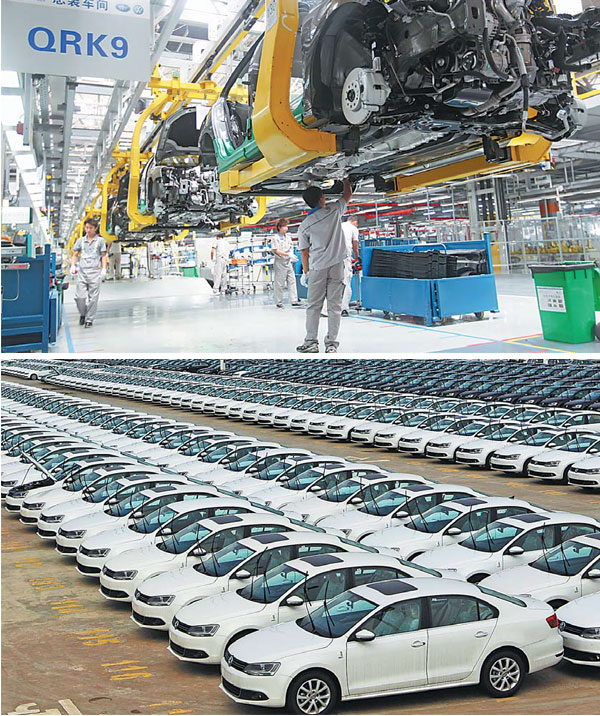Chengdu rides clean, green machines
Updated: 2015-03-27 07:30
By Hu Haiyan, Li Yu and Peng Chao(China Daily Europe)
|
|||||||||||
Electric cars and other forms of new-energy vehicles are giving city's economy a positive jolt
When Shi Dixin decided to return to his hometown of Chengdu in 2011 with ambitious plans to start up a business making electric vehicles, he realized he would have his work cut out in a city that was a latecomer to the industry. "I had long nursed the dream of building electric vehicles or other environmentally friendly motor vehicles," says Shi, chairman and founder of Chengdu Laintem Motors Control Technology Co Ltd.
"The industry in Chengdu was not that well-developed, but big car companies such as Geely, Volvo and FAW-Volkswagen have set up shop here in recent years. The motor vehicle industry then really took off, so I thought it was time I came back to the city to catch up with everything."
|
The Chengdu Economic and Technology Development Zone in Longquanyi district. The zone has become one of the largest car manufacturing centers in the country. Photos provided to China Daily |
|
From top: Workers at FAW-Volkswagen's assembly site in Chengdu Economic and Technology Development Zone, and vehicles produced at the zone. In 2013, 732,000 vehicles rolled off the assembly line in the zone. |
Shi is a graduate of Harbin Institute of Technology in Heilongjiang province, Northeast China, and has worked in the motor vehicle industry for about 10 years, including several years away from Chengdu.
He set up his company the year after his return to the city where he was born, and it now has a workforce of 97. Among them, 58 concentrate on developing technology.
The company had revenue of more than 23 million yuan ($3.7 million; 3.4 million euros) last year, with profit of 3 million yuan, and expects revenue to shoot up to 150 million yuan this year, Shi says.
Shi's experience reflects the fact that Chengdu, the capital of Sichuan province and one of the fastest-growing cities in southwestern China, has become a major center in motor vehicle manufacturing.
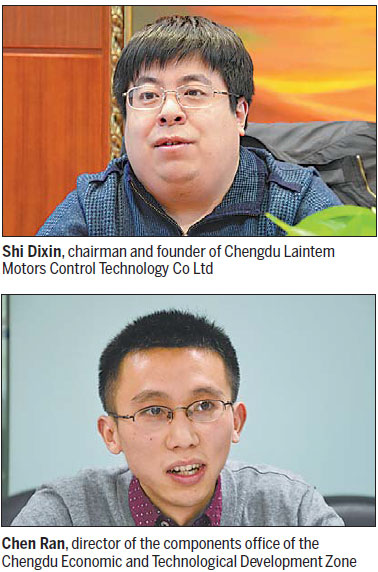
With exports of both traditional and new-energy vehicles, Chengdu, one of whose main claims to global fame is its giant pandas, has added another powerful weapon to its economic armory.
Last year the city's GDP was about 1 trillion yuan, 8.9 percent higher than the year before. The automobile industry is reckoned to account for about 13 percent of GDP.
Chengdu Economic and Technology Development Zone, about 13 kilometers from downtown Chengdu, can claim a large amount of credit for the automotive manufacturing prowess the city now enjoys.
The zone, which covers 150 square kilometers and which was set up about 25 years ago, has become one of the largest car manufacturing centers in the country.
Eleven motor vehicle manufacturers and more than 300 car industry-related companies are located there, making it the second-largest car manufacturing city in western China after Chongqing.
In 2013, 732,000 vehicles rolled off the assembly line in the zone, about 90 percent of the motor vehicles made in Sichuan. The number of cars produced shot up to more than 900,000 last year.
More than 56,000 people are engaged in the motor vehicle industry in the zone, and the 15 companies that make motor vehicles and automotive parts had turnover of 107.4 billion yuan last year, zone managers say.
The Chinese Association of Automobile Manufacturers says 23.5 million vehicles were sold in the country last year and that this will rise to about 25 million, an increase of 7 percent, this year.
The country will have the capacity to turn out 40 million vehicles this year, but at least one-third of the country's motor vehicle assembly lines will remain idle, the association says.
However, in this climate of overcapacity, Chengdu is bucking the trend.
Chen Ran, director of the components office of the Chengdu Economic and Technological Development Zone, says the motor vehicle industry in the zone is benefiting from unflagging demand locally.
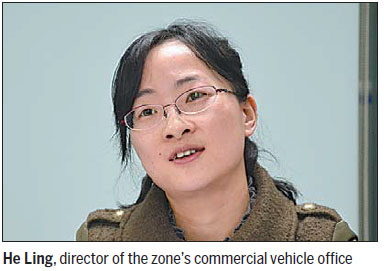
"Sichuan has a population of 80.4 mllion and Chengdu about 16 million. Fewer than one in 50 people own a car, which means there is huge potential for the car industry.
"In addition, the industry stands to benefit as urbanization continues apace."
It is forecast that by 2020 1.7 million motor vehicles will be produced in the zone a year, and that the industry will have revenue of 250 billion yuan a year, Chen says.
In 2013, the car parts industry had revenue of 19 billion yuan, generating tax of 2 billion yuan. From January to November last year, the industry had revenue of 19.2 billion yuan and contributed 1.88 billion yuan in taxes to government coffers.
Chen attributes the fast growth of the car industry in Chengdu, whose promotional motto is "Chengdu can do", to the city's wealth of know-how in automotive research and development.
Last year about 3.6 billion yuan was invested in R&D, 24.8 percent more than in 2013, zone managers say. More than 20 motor vehicle technology development companies have been established in the zone as have 123 high-tech companies and 38 national- and provincial-level research centers.
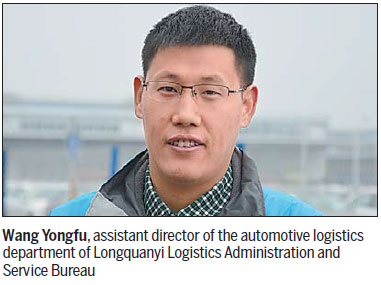
He Ling, director of the zone's commercial vehicle office, says that as the motor vehicle industry continues to grow in the zone, the industry will diversify its product mix.
"For example, we will make more new-energy vehicles here." Ten motor vehicle and components R&D projects are being carried out, of which five relate to car companies, with a capacity of 19,500 vehicles.
Last year more than 300 new-energy vehicles were produced in the zone, bringing in revenue of 200 million yuan.
Shi of Chengdu Laintem Motors Control Technology says Chengdu provides a rich pool of talent to those in the industry.
"Our company has R&D in its genes. We employ seven experts from overseas, and last year about 20 percent of our revenue went into R&D."
The company owns 27 patents, he says, but "the most valuable assets we have are the skills and talents of our staff".
Chengdu has 52 higher education institutions with 751,000 students and 86 secondary vocational schools with 230,000 students.
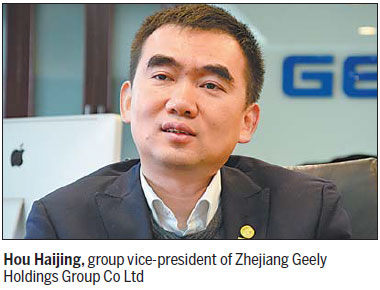
"That means we can find most of the people we recruit here," says Shi, as he stands in an electric bus his company built.
The prices of the buses range from 1.8 million yuan to 2 million yuan, but with a provincial government subsidy, the bus sells for less than 900,000 yuan.
"Last year we exported electric engines to Japan and France, and are looking to sell more overseas once we have grabbed a bigger share of the domestic market."
The company has worked with other motor vehicle builders such as FAW Bus and Coach Co to expand and is looking to work with others, he says.
"But we do still face some big challenges. Most new-energy vehicles in China are made in Beijing, Zhejiang province and Jiangsu province or Guangzhou, and Chengdu is a bit remote from all these."
Wang Yongfu, assistant director of the automotive logistics department of Longquanyi Logistics Administration and Service Bureau, says the logistics capabilities of Chengdu are a great asset to the automotive industry, particularly as it looks to increase its exports.
"Many big automotive logistics companies have set up operations here," says Wang, speaking as he points to thousands of cars being prepared for transport.
"Besides road transport, Chengdu can also increase international sales through its international rail links, such as Chengdu-Europe Rail and Central Asian Rail. The latter sets out to the five central Asian countries of Kazakhstan, Kyrgyzstan, Uzbekistan, Tajikistan and Turkmenistan, running every 10 days and taking about five to seven days to pass through them to its ultimate destination.
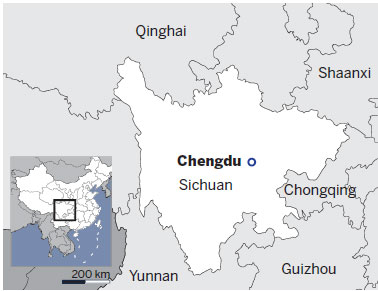
"Some international railways that connect Chengdu with the rest of the world are helping local car companies build their international business."
Hou Haijing, group vice-president of Zhejiang Geely Holdings Group Co Ltd, the largest private carmaker in China, says Geely is well positioned to expand its overseas business even with its manufacturing in landlocked Chengdu.
Geely's operations in Chengdu, set up at a cost of 3 billion yuan in 2011 and covering 150,000 square meters, employ 1,500 people.
The Chengdu factory produced about 65,000 vehicles last year, 7.6 percent more than the year before, and it forecasts that it will produce about 80,000 vehicles this year, Hou says.
"Our local company is critical to the Geely group's success. It is Geely's only factory that focuses on producing SUVs. All of our SUVs are made here. We started to use the Central Asian international line when it opened last year, and as a result our exports from Chengdu have risen almost 15 percent compared with 2013."
The SUVs made in Chengdu go to 10 countries and regions including Azerbaijan, Belarus, Brazil, Iran, Russia, Saudi Arabia and Ukraine, he says.
"These car exports are just at their early stage, and if there is another international rail link the exports will grow further.
"We don't export to Europe and the United States yet, but we plan to soon. We plan to make full use of the international railways in Chengdu and make made-in-China vehicles world famous. I reckon that day is not far away."
Contact the writers through huhaiyan@chinadaily.com.cn
( China Daily European Weekly 03/27/2015 page16)
Today's Top News
Voice recordings show one pilot locked out cockpit
Geely to invest $372m on new London Taxi facility
Netherlands' PM to meet with Xi
Italian vineyards see a glass that's half full in China
Moscow says US security strategy 'anti-Russia'
Cockpit voice recorder of crashed airliner found, probe under way
Queen approves new coin for birth of second baby of Prince William
House passes resolution urging Obama to send arms to Ukraine
Hot Topics
Lunar probe , China growth forecasts, Emission rules get tougher, China seen through 'colored lens', International board,
Editor's Picks

|

|

|

|

|

|

